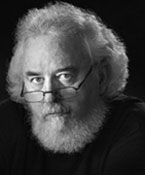Why Tony Robbins Never Talks about Funerals on Larry King Live and Other Dirty Tricks that Life Plays on the Happiness-Is-a-Vibration Gurus and Their Followers
Channel-flipping the other night, I mindlessly managed to let Larry King Live out of the TV genie’s bottle.
Actually, sometimes I watch his entire show. As when Bill Maher, the philosopher comedian, sheds more truth in an hour (minus commercials) than a year’s worth of Meet the Press. No such luck tonight. Tonight, I get “Chicken Soup for the Soul” genius Jack Canfield. Joe Vitale, the hypno-marketing/minister/therapist. And three other think-yourself-happy-happy-happy gurus.
King prattled his way through this opening: “Tonight, want to find true love, make more money, have the life of your dreams? Then think about it. That’s right. The power of your thoughts can improve your life. Sound unthinkable? Well, science says there’s something to it, so engage your brain for an amazing hour that could transform your world and help you live happily ever after.”
And the first question goes to an everything-is-energy-and-vibration authority named James Ray, famed for his “Law of Attraction.”
Which is what?
Answers Ray: “The law of attraction says when you’re in a certain vibration you’re going to attract to you that which you’re in vibration or harmonic vibration with”—and they’re off, en masse, host and hosted, to live happily ever after, or at least for the next hour, pontificating about how to think yourself into a frenzy of continual bliss.
I’m being overly cynical. Believe it or not, we brain-function-studies types watch the
think-yourself-happy-happy-happy gurus as closely as most. Because they have outsized followings at the moment in the most advanced of our societies, including the U.S., the U.K., and Europe in particular. In those parts of society where there is surplus wealth, the happiness-is-a-state-of mind cult can flourish. It’s not that most of the followers of the Jack Canfields and Joe Vitales and James Rays necessarily have a lot of surplus wealth. It’s just that they are, at least momentarily, freed of just enough of the grimmer realities of life enough of the time to think that they can have a surplus of wealth, happiness and all else if only they get their vibrations right.
I wish them well … and wellness. But I can’t help but wonder what they would have had to say to people in neighborhoods where my family and I have lived on occasion of the onset of totally unexpected vibrations like these: (1) At 4 in the morning, a 21-year-old inebriated youth fails to make the slight curve at the end of our street, steers his car straight into a tree and dies instantly three doors down from our house. For days, his young friends stop, park, approach the tree, kneel, leave flowers, shout out feelings of hurt, lean on supportive shoulders or pull away angrily and flee. (2) Our next door neighbor was 48. He died a few weeks ago of a heart attack while coaching his son’s soccer game. Our banker said the mother of five was sobbing so hard when she opened the bank account for gifts to the children’s college fund in his memory it saddened the whole bank staff. (3) The son was 29, a life-long sufferer from schizophrenia—and off his meds. He shot his father to death upstairs while his mother fled to hide in a downstairs closet, cell phone in hand. Our teenaged daughter was home alone next door. It happened during a shift change at the police station. It took the cops forever to arrive. Who knows what else might have happened?
And these are some of the safest neighborhoods, statistically, in America. And this is what the happiness-is-a-state-of mind cults almost always ignore.
So I won’t.
The chances are pretty remote that you’ll ever be watching Dudley Lynch Live on CNN, but if it happens, here’s my opening night’s line-up of guests:
Dr. Thomas Attig, author of How We Grieve: Relearning the World and The Heart of Grief: Death and the Search for Lasting Love. Attig is an expert on brain vibrations, too. The vibrations of bereavement. In How We Grieve, an especially fine work, he warns about how our brains must struggle during extreme grief with a long list of vibrating vulnerabilities. And of all that the brain must relearn: the world, ourselves, our relationships with the deceased, as starters. Powerful stuff, experienced every moment by someone somewhere, maybe even next door.
Dr. Stephen Law, author of The Philosophy Gym: 25 Short Adventures in Thinking. As regular readers of this blog know, I tend to be critical, dismissive even, of a huge amount of what philosophers think, write and say. But not of this philosopher’s work. He wants us all to be better thinkers and use some of the tools of philosophy to assure that we don’t live unexamined lives. In The Gym, he teaches us how to “question the assumptions and unpick the arguments” of people who would rather we be sheep than shepherd (and who often appear on Larry King Live).
And, of course, representatives from the families of the people who have died suddenly in recent years almost within an arm’s reach of my front door. How have their brains coped when so much of what they were in “harmonic vibration” with suddenly disappeared or unraveled?
I may even invite Larry King. I’d like to ask him what he really thinks of the think-yourself-happy-happy-happy gurus he keeps inviting on his show.
You can read the transcript of the Larry King Live program here: “The Power of Positive Thinking”
Order Tom Attig’s books here:
The Heart of Grief: Death and the Search for Lasting Love
How We Grieve: Relearning the World
There’s an interview with Attig here: “Interview with Tom”
Order Stephan Law’s book here: The Philosophy Gym: 25 Short Adventures in Thinking
Go here for Law’s web site: “Thinking Big”


